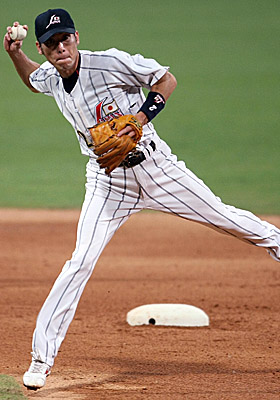The news dropped the day after Thanksgiving like one of those turkeys from of the sky in the classic old WKRP in Cincinnati episode ("As God is my witness, I thought turkeys could fly!" big guy Arthur Carlson moaned as fowls splattered around him in a mall parking lot): The Minnesota Twins won exclusive negotiating rights to Japanese infielder Tsuyoshi Nishioka.
Time was, the Twins wouldn't have out-bid Scrooge himself for a player up for auction -- on the international market, the national market or Boston Market.
Now, they've got 30 days to seal a deal with the Japanese Pacific League batting champion.
Whether it is the move that ultimately helps allow the Twins to fly past the Yankees in October, time will tell.
But this deal, if the Twins pull it off (and indications are that they will), makes them better. It adds versatility to their lineup and adds speed up the middle. Both are very good things.
 | |
Nishoika claims no preference on whether to play second base or shortstop. (Getty Images) |
The Twins won the exclusive negotiating rights with a bid of roughly $5 million. Estimates are that it will take something in the neighborhood of a three-year deal worth between $8 million and $10 million. The Twins have until Dec. 27 to strike a deal, or Nishioka must return to Chiba Lotte.
Nishioka is 26, and he batted .346 for the Marines last summer. He also helped them win their first Japan Series championship since 2005. He finished the season with 206 hits, becoming the first Pacific League player to get 200 hits since a fellow named Ichiro Suzuki.
"He's a good athlete," says one director of international scouting for a rival club who has seen Nishioka play plenty. "He has very good tools. He's a young guy who, the last three, four, five years, the Japanese people would get on him because he was all about ability, and he was a little flashy for Japan."
The flash mostly was innocent, played out in non-conformist ways. One year, he showed up to the park with highlights in his hair. Sometimes, if teammates were wearing their pant-legs high, he'd wear his low. That sort of stuff.
"But he's toned his act down, and he's matured," the scout says. "He was the wonder boy, the golden boy, who when he first came up never lived up to expectations.
"He's got good feet and nice range, and his bat has improved a lot. I'm not saying he's going to be Ozzie Smith or Omar Vizquel, but when a guy can play shortstop, run the bases and gets enough at-bats so that he learns how to hit. ...
"I don't know where he will fit in with the Twins' lineup. I don't know if he'll hit at the top right away. Maybe he'll hit lower early and then move up."
That will be decided by Ron Gardenhire, the AL Manager of the Year, during spring training and beyond -- if the Twins complete the deal. All indications are that Nishioka, who is still three years away from free agency in Japan, is eager to play in the United States.
As an encore to their club-record $96 million payroll, this is a flashy move for the Twins.
As an overall strategy taken within the context of recent moves, it fits a thorough Minnesota pattern.
A year ago July, the Twins signed a high-profile 16-year-old outfielder from Germany named Max Kepler (assessment by multiple scouts: Best European prospect in years).
A year ago September, the Twins signed a high-profile 16-year-old shortstop from the Dominican Republic named Miguel Angel Sano (scouts consensus: Widely considered to be the top teenage talent in that country).
"Our payroll always has been a function of revenue, and that will continue," Smith says of the Twins' largesse, which is still taking some getting used to. "We pushed it pretty much to the limit last year.
"We've been aggressive in the international market. We've signed good, young talent in Venezuela [dating back to Luis Rivas in the 1990s]. We've always been aggressive in Australia. Our scouting has increased in Japan the last few years. We've got a good staff over there and we're trying to get better.
"This isn't something that just happened this year. We've been working hard in international scouting for the past 10 years or so."
Longer than that, truth be told.
Like a growing number of clubs today, the Twins maintain scouts all over the globe. They have full-time scouts in Korea, Australia and Taiwan. They have several scouts in Asia.
"The Twins don't make mistakes evaluating players," says the director of international scouting for a rival club. "They're very thorough, all of their scouts, both internationally and nationally.
"They do as good a job going through this process as anybody. They don't make many mistakes."
By all accounts, Nishioka has matured into a hard worker, which, in Minnesota, undoubtedly will aid in his transition. Now, will he veer more toward Akinori Iwamura, or Ichiro?
Yes, the annual playoff spanking administered by the Yankees last month remains an open wound. But not the paralyzing kind.
"First off, we had a tremendous year," Smith says. "Our first year at Target Field, we had a lot of great moments. We won our sixth division title in nine years. It's something we're very proud of.
"Everyone in the organization wishes we had beaten the Yankees and won the World Series. But we lick our wounds quickly, and we'll move on to next year."
extracted from cbssports.com



 4:36 a.m.
4:36 a.m.
0 comments:
Publicar un comentario